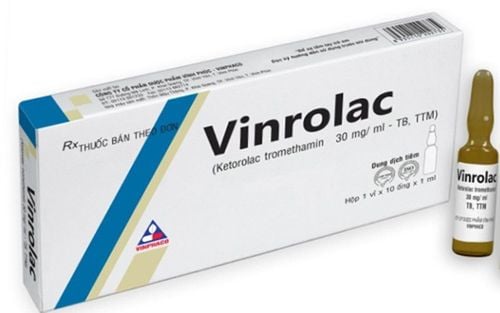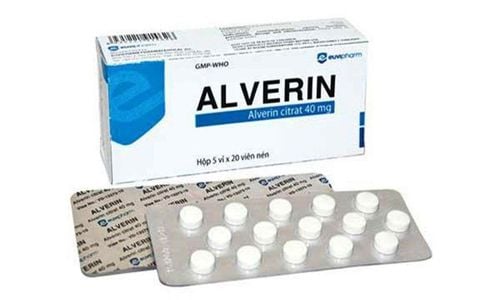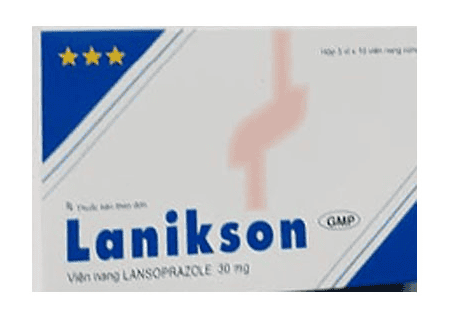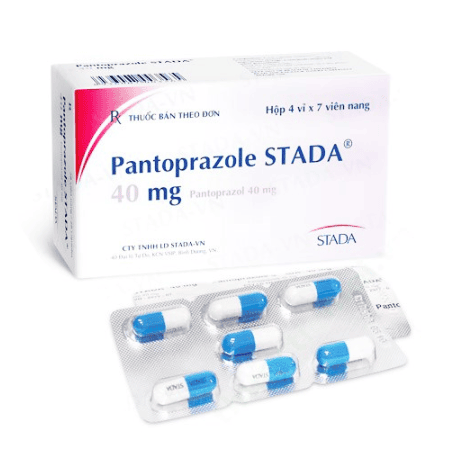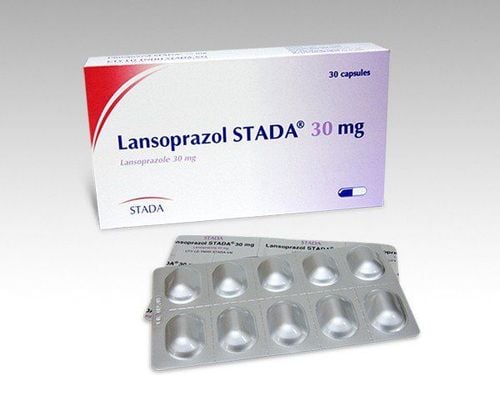This is an automatically translated article.
Gastevin is a medicine used in the treatment of a number of gastrointestinal conditions. Let's find out what Gastevin does in the following article:1. What is the effect of Gastevin?
What does Gastevin do? Gastevin is a gastrointestinal drug, made in the form of hard capsules, with the main ingredient in each tablet is Lansoprazole 30mg.
Lansoprazole is a gastric proton pump inhibitor. The mechanism of this active ingredient is that it inhibits the final stage of gastric acid formation by blocking the activity of H + / K + ATPase of gastric parietal cells. This inhibition is dose dependent.
At a dose of 30 mg, Lansoprazole is able to inhibit about 80% of gastric acid secretion stimulated by pentagastrin. Using this medicine every day continuously for a week will reduce the secretion of stomach acid by 90%. Reducing gastric acid will help relieve the symptoms of duodenal ulcer and heal within 2 weeks, for peptic ulcer and esophageal reflux will reduce within 4 weeks.
Gastevin is indicated in the following cases:
Peptic ulcer. Gastroesophageal reflux. Aids in the symptomatic treatment of heartburn and acid reflux. Combination with antibiotics in the treatment of Helicobacter pylori infection. Treatment and prevention of peptic ulcer disease in patients taking NSAIDs. Treatment relieves symptoms of Zollinger - Ellison syndrome such as severe abdominal pain, diarrhea. Gastevin is contraindicated in the following cases:
People who are sensitive to any of the ingredients of the drug. Malignant gastric ulcer. Special note when using Gastevin:
Be careful when using Gastevin for patients with moderate and severe liver dysfunction. Decreased stomach acid caused by Gastevin may increase the number of bacteria present in the digestive tract. Gastevin treatment may lead to a slightly increased risk of gastrointestinal infections due to Salmonella and Campylobacter . Gastevin should not be used for a long time. If Gastevin is to be used long-term, the treatment regimen should be regularly reviewed and the risks and benefits assessed carefully in these patients.
2. Dosage and how to use Gastevin
How to use Gastevin:
The drug is used orally. Time to take the drug: Take Gastevin after a meal for the drug to promote its full effect. The patient should swallow the tablet whole, do not chew, break, or crush the tablet. Accordingly, Gastevin should be taken with a full glass of water. During the use of Gastevin, you need to follow your doctor's instructions, do not arbitrarily adjust the dose. The dose of Gastevin should be according to the doctor's prescription. The recommended dosage of Gastevin is as follows:
Treatment of duodenal ulcer: Use 1 tablet x 1 time / day, for 2 weeks. In case of necessity, the above dose can be continued for another 2 weeks.. Treatment of stomach ulcers: Use a dose of 1 tablet x 1 time/day, for 4 weeks.. If the ulcer has not healed, it can be continued. Continue taking the drug at the above dose for another 4 weeks. Reflux esophagitis: Use 1 tablet x 1 time / day, for 4 weeks. In case of necessity, Gastevin can be continued for another 4 weeks. Prophylaxis of reflux esophagitis: Use dose 15mg x 1 time/day. The dose may be increased to 30 mg per day if necessary. Eradicate Helicobacter pylori: Use 1 tablet x 2 times daily for 7 days and combine with one of the following antibiotic combinations: Clarithromycin 250-500 mg x 2 times/day + Amoxicillin 1g x 2 times/day. Clarithromycin 250mg x 2 times/day + Metronidazol 400-500mg x 2 times/day. Treatment of benign gastric and duodenal ulcers caused by NSAIDs: Use 1 tablet/time/day for 4 weeks. Symptomatic gastroesophageal reflux disease: Use a dose of 15mg or 30mg daily. Zollinger-Ellison syndrome: The starting dose is 2 tablets x 1 time/day. The maintenance dose of the drug can be up to 6 tablets. If the daily dose of Gastevin is more than 4 tablets, it should be divided and taken 2 times a day. In patients with moderate and severe hepatic impairment, a 50% reduction in the usual dose is required. If you forget a dose of Gastevin, you should take it as soon as you remember. If it is almost time for your next dose, skip the missed dose. Do not use double the usual dose to make up for the missed dose.
There have been no reports of overdose cases of Gastevin. If you have unusual symptoms when you overdose on Gastevin, tell your doctor immediately or go to the nearest medical center for timely treatment.
3. Gastevin side effects
During the course of taking Gastevin, you may encounter some side effects with the corresponding frequencies as follows:
Common side effects of Gastevin include:
Headache, dizziness Nausea, vomiting. Stomach pain Diarrhea Constipation Bloating. Increased liver enzyme levels. Urticaria, itching, rash Feeling tired. Uncommon side effects include:
Leukopenia, thrombocytopenia, eosinophilia. Joint pain, muscle pain, edema. Rare side effects of Gastevin include:
Anemia Hallucinations Insomnia Confusion Confusion Feeling dizzy Drowsiness. Visual disturbances Hepatitis Jaundice Jaundice Interstitial nephritis Angioedema Fever. Very rare side effects of Gastevin include:
Leukopenia Anaphylactic shock. Colitis Inflammation of the mouth. Stevens-Johnson syndrome. Toxic epidermal necrolysis. If you experience any side effects of the drug, notify your doctor immediately or go to the nearest medical facility for timely treatment.
4. Gastevin drug interactions with other drugs
HIV protease inhibitors : May reduce the effect of Gastevin when used together. Gastevin may result in subtherapeutic concentrations of ketoconazole and itraconazole, so the combination should be avoided. Concomitant administration of Gastevin and digoxin may lead to increased plasma concentrations of digoxin. Concomitant administration of Gastevin with high doses of methotrexate may increase and prolong serum concentrations of methotrexate, which may lead to methotrexate toxicity. Co-administration of 60 mg Gastevin and warfarin had no effect on the pharmacokinetics of warfarin or the INR. However, an increase in INR and prothrombin time has been reported in patients receiving concomitant PPIs and warfarin. Increased INR and prothrombin time can lead to abnormal bleeding and even death. Gastevin may increase plasma concentrations of drugs metabolised by CYP3A4. Gastevin is a medicine indicated for the treatment of gastrointestinal diseases with the main ingredient in each tablet being Lansoprazole 30mg. To ensure the effectiveness of treatment and avoid unwanted side effects, patients need to take the medicine according to the prescription according to the instructions of the doctor, professional pharmacist.
Follow Vinmec International General Hospital website to get more health, nutrition and beauty information to protect the health of yourself and your loved ones in your family.
Please dial HOTLINE for more information or register for an appointment HERE. Download MyVinmec app to make appointments faster and to manage your bookings easily.





